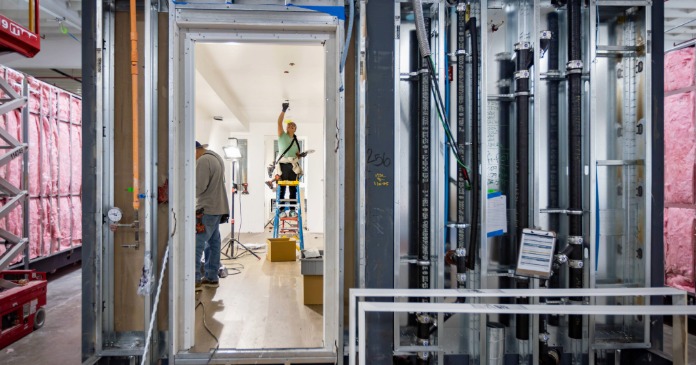
Logos Faith Development (LOGOS), a Los Angeles-based, mission-driven real estate development firm specializing in transforming underutilized church land into community-centered affordable housing, plans to build multiple projects using the innovative Model/Z modular housing units.
Pastor Martin Porter, Founder and CEO of Logos Faith Development, continues to evolve a new model of working with faith-based organizations to unlock the value of their land to provide critically needed affordable and workforce housing. Porter and his firm, LOGOS, have formalized this partnership with Model/Z to create new approaches to addressing the housing crisis in California.
Model/Z was founded by affordable housing pioneers, Martin Muoto and Gray Lusk, to deliver housing faster, much more cost-effectively, and with significantly less waste than traditional “stick built” construction. Porter and Muoto have a long-standing professional relationship and are both leaders in social impact housing, driven by a shared mission to build cost-effective, high-quality affordable housing in underserved communities.
Pastor Porter, says, “We are excited to be using the Model/Z modular units and its Z/Suite technology on LOGOS’ 105th and Central project and look forward to leveraging the high quality, price certainty, and high efficiency that Model/Z offers for new construction projects. Martin Muoto and I have been collaborators for more than five years now and have a shared passion to create housing solutions for the most vulnerable members of society. With Model/Z’s modular units and software enhanced design, we will be able to provide affordable housing faster, more cost effectively, and best-in-class housing at scale. LOGOS brings an approach that is anchored on utilizing underused church land. We are finding many faith-based organizations are looking for ways to supplement their finances, be good stewards of their resources, and expand their heavenly mission into housing. The partnership with Model/Z allows us to meet this need with tremendous impact across California.”
The first project that LOGOS and Model/Z will work on is a 91-unit, five-story affordable apartment community at 105th Street and Central Avenue in South Los Angeles. Site work is scheduled to begin in 2026, with first residents projected to move in later in the year. LOGOS has a development pipeline valued in excess of $500 million that spans more than 2,000 units and encompasses more than 240 faith-based organizations. The developer recently secured a $11 million strategic capital commitment from a private family foundation to support its development pipeline and enhance LOGOS’ ability to reach the construction phase across 12 development sites in Los Angeles and San Diego over the next two years.
Model/Z Founder, Martin Muoto, expressed, “I am thrilled to have LOGOS both as a client and a partner for Model/Z. I have long admired Pastor Porter’s model, and it aligns deeply with our mission, both at SoLa Impact and at Model/Z. We need more bold impact leaders like Pastor Porter and his team with a demonstrated track record of working with churches to address Los Angeles’ critical housing shortage.”
Pablo Ucar, Model/Z’s SVP of Operations who brings a deep background of world-class execution from his previous experience at Space/X and several leading automotive companies, added, “Every housing unit is fully completed and leaves our factory in Watts ready to install. They are code-compliant, and ready to set in a single day. We have significantly shortened the construction timelines in Los Angeles. We expect to have “heads-in-beds” within a few months once the project’s grading and foundation are complete. Furthermore, Model/Z is also able to guarantee and hold constant a significant portion of each project’s hard costs, which in this environment of unpredictable tariffs and labor uncertainty, is what every developer is looking for.”
The project illustrates one way in which LOGOS can work with faith organizations to unlock land value and create mission-aligned income without the long oversight cycles of conventional construction. Model/Z’s universal 420-square-foot chassis meets California’s Factory-Built Housing standards, HUD Section 8 rules, and ADA Chapter 11B requirements. Model/Z modules arrive with fully complete plumbing, electrical and MEPs, and kitchens, baths, and energy-efficient systems already installed, so no further interior work is required. Because of Model/Z’s standardization, cranes can set several units per day, and the full project can reach Certificate of Occupancy in fewer than six months, dramatically reducing cost of capital and improving developer’s returns. Model/Z’s Watts facility, a 150 000-square-foot plant staffed largely by local residents and vocationally trained assembly workers, currently produces about 2.5 Model/Z modules per day and is designed to scale to 5,000 units per year.












